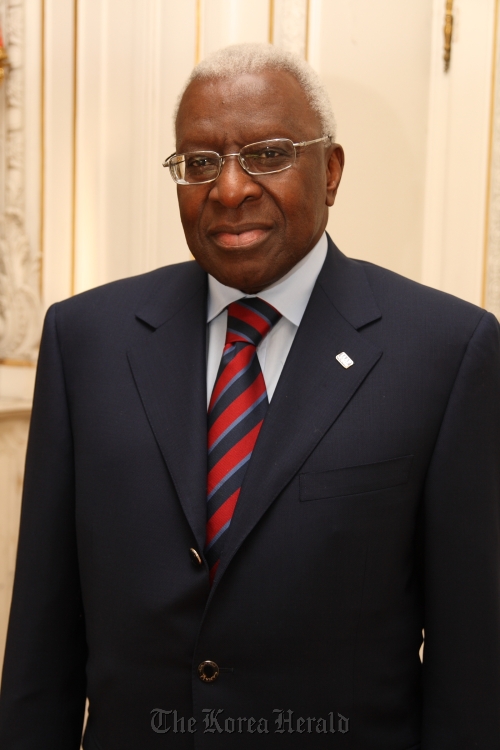With just two weeks to go until the opening of the Daegu World Championships, the head of athletics governing body said that he was confident over Daegu’s preparations to stage the world’s biggest athletics event.
“I can confidently say the facilities are world class,” said Lamine Diack, the president of International Association of Athletics Federations.
The 77-year-old official, who has been serving as the chief of the IAAF since 1999, said in an email interview with The Korea Herald that he believes that through the nine-day competition Daegu’s position on the world map will be greatly enhanced.
“Over 200 nations, 2,000 athletes and 10,500 officials and volunteers will take part in Daegu 2011. It’s an enormous organizational task for any city to manage but we are confident that Daegu will live up to the impressive history of these championships,” he said.
 |
IAAF President Lamine Diack. (IAAF) |
Q: Is there any special feature at the Daegu event compared with previous IAAF events?
A: A brand new and modern approach has led to a revamped and revolutionized competition timetable which has been designed to reach optimum impact for both the fans and media on the one hand but also in order to support athletes.
The philosophy behind the new competition timetable in Daegu which was presented by the IAAF Competition Delegates and approved by the IAAF Council was threefold; to have evening sessions of not more than 3 hours, to have a balanced number of finals across all days and to schedule qualification rounds in the morning sessions only.
Q: What do you expect from the Daegu Championships? A: Thanks to my many enjoyable visits to Korea it is abundantly clear that the country possesses a rich history which, mixed with Korea’s rapid economic development in the last few decades, makes it a modern, exciting and dynamic environment in which to hold a major sporting event.
Furthermore, based upon the record broadcasting figures from Berlin in 2009, we expect a cumulative TV audience of 8 billion worldwide to watch this sporting spectacular in Daegu.
There can also be no better motivation for the youth of Korea, and Asia as a whole, than the excitement of seeing at first hand the world’s best athletes competing on their continent. I’m sure that the performances of global stars of the stature of Bolt, Rudisha, Xiang, Felix, Vlasic, and Isinbayeva, will help reinforce the message that athletics is a young, vibrant and spectacular sport which is accessible to all.
Q: What kind of legacy will the Daegu Championships leave in Korea?
A: Daegu 2011 will be the third time that the IAAF World Championships has been hosted in Asia, following Tokyo in 1991 and Osaka in 2007, and this year’s championships offer us opportunities to promote and develop athletics in Korea and Asia in general. On the most basic of levels the enhanced sporting facilities in Daegu, let alone the inspiration of seeing and in some cases competing against the world’s best athletes, will encourage more Koreans to take part in athletics whether that be recreationally, with its associated health benefits for society, or competitively, which will see a stronger national team emerge.
This nine-day sporting spectacle will give the world the opportunity to get to know Daegu and its colorful brand, to engage with its people and their culture, and as result the city’s position on the world map will be greatly enhanced.
By Oh Kyu-wook (
596story@heraldcorp.com)







![[Today’s K-pop] Blackpink’s Jennie, Lisa invited to Coachella as solo acts](http://res.heraldm.com/phpwas/restmb_idxmake.php?idx=644&simg=/content/image/2024/11/21/20241121050099_0.jpg)
